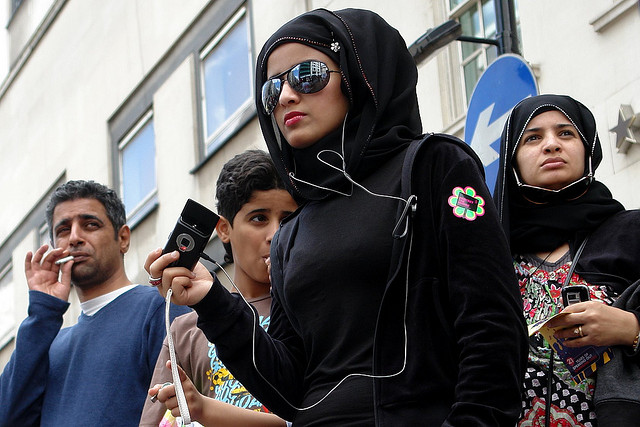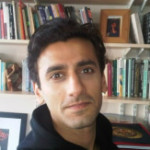Muslim civil society organisations in Britain negotiate accusations of sectarianism when they engage in democratic politics
Some believe the ‘Muslim vote’ might be influential in the next UK General Election in 2015. In this post, Jan Dobbernack, Nasar Meer and Tariq Modood address some misconceptions about Muslim participation in democracy. They argue that Muslims face a very challenging environment when engaging in politics, but are no more likely to be cynical about the democratic process than other groups, and accusations that Muslims pursue sectarian or grievance-based politics are inaccurate.

It is difficult to make predictions about the ‘Muslim vote’ at the 2015 General Election. Credit: Charles Roffey, CC BY-NC-SA 2.0
The participation of Muslims in British politics, it seems, invites particular interest during General Elections. In the run-up to 2015, there is already some speculation about whether a ‘Muslim Vote’ can be said to exist and, if so, in what form; what the issues uniting Muslim constituencies are; and what strategies and messages are required for effective advocacy on such issues.
This uncertainty is present among political parties and in Muslim civil society alike. Mainstream parties are manifestly undecided to what extent – and in what ways – they should target Muslim voters. It is too early to say if the Conservatives will continue their outreach to ethnic minority citizen or, under pressure from UKIP, will ‘get the barnacles off the boat’ and what this will mean in practice. Where interest in the well-being of minority voters is proclaimed, this often also includes a note of caution not to treat ‘minority citizens as a bloc vote’ (Sadiq Khan). For Labour, this cautious approach is partially a reflection of past political patronage, which is now not just considered disreputable but also electorally perilous.
Civil society organisations that mobilize constituents on the basis of Muslim identities thus encounter a politically charged environment. The contentious status of these identities in contemporary Britain amplifies anxieties over the role that ethnicity or religion should assume in a liberal democracy. Our research has shown that Muslim civil society organisations are highly responsive to features of this environment, and attempt to formulate political messages that can avoid stigmas such as ‘sectarianism’ or ‘grievance politics’. It is too early to predict the battle lines around a ‘Muslim Vote’ in 2015, and to what extent this vote will appear as a significant threat or an untapped potential. Examining political dynamics during the last General Election, however, may help us understand the debates that are likely to unfold in the year ahead.
The Ethnic Minority British Election Survey that was conducted in 2010 has challenged the myth of ‘alienation’ and revealed that British Muslims do not lack a commitment to British politics. There is no sign that they are more cynical about the political process than non-Muslim voters. In fact the opposite appears to be the case; the religious group that shows the lowest rate of dissatisfaction with British democracy are Sunnis.
Such findings reinforce the split that politically conscious Muslims experience when their alleged ‘disenchantment’ is paraded in public. It is a frequent complaint among Muslims at all levels of political life that their presence in British politics is misconstrued. Activists who mobilize on the basis of Muslim religious identities often encounter the charge that they foster communal divisions. Hence following his victory in the Bradford West by-election, a salient charge was that George Galloway’s success was attributable to electoral choices made by a homogeneous Muslim voting bloc. Less attention was given to the role of young voters and disenchantment with Labour’s alleged exploitation of kinship networks (biraderi), factors largely passed over even by commentators generally supportive of Muslim identity politics. Right-wing commentators meanwhile converged on the view that Galloway’s success showed ‘that sectarian politics are now alive and well in Britain’ and that British Muslims eagerly responded when they were addressed ‘not as primarily British citizens but solely as Muslims’. As an example for the ‘ugly alliance between the far left and Islamists’, Abhijit Pandya pointed to ‘groups like Operation Black Vote and the Muslim Public Affairs Committee [that] are busy encouraging such communities to vote along racial and religious lines.’
Our research has focused on the work done by the Muslim Council of Britain (MCB), ENGAGE, the Muslim Public Affairs Committee (MPAC) the Youelect initiative, and, as a non-Muslim group, Operation Black Vote (OBV). We have examined the political manoeuvring of these groups and their attempts to mobilize minority citizens by appealing, in one way or another, to collective concerns, interests and identities. It is our contention that we can learn something not just about Muslim civil society, but about features of British political life more generally, by examining their political agency.
Muslim advocacy organisations feel the need to respond to a number of errors in how they find themselves perceived, either by challenging the relevant claims or by showcasing alternative understandings. Five dimensions stand out in particular:
- Muslim identity politics as markedly different in kind
- Muslim political actors as toxic
- Muslim politics as purely reactive, grievance-based, ‘pariah politics’
- Muslim concerns as sectarian and incompatible with ‘common good’
- Failure to account for the dynamic positioning and complexity of Muslim identities and concerns
These experiences of ‘misrecognition’ do not necessarily determine Muslim political agency. But in one form or another, advocacy organisations respond to them and desire to project and practice civic identities, to demonstrate their normality and a commitment to the ‘common good’.
The experience of stigmatization in the public sphere leads some organisations to be careful when framing their political concerns. Some of the initiatives that we examined, for example, choose not to prominently highlight Muslim-specific issues. Their concern is that anything with ‘the pre-fix of Islam or Muslim has a negative connotation immediately and [that] there is a counterproductive element’, as one of our respondents put it – a result of the public ‘toxicity’ of Muslim concerns.
Responding differently to such negative perceptions, other organisations highlight a Muslim agenda in order achieve an ‘acknowledgement that this is a constituency that [politicians] cannot ignore’. They suggest that an assertive appeal to shared identities can help increase the public visibility of important concerns and elicit a response from campaigning politicians.
Despite considerable difference, there is a common desire among Muslim advocacy groups for the recognition of the democratic normality of their political identities and concerns. Yet they face a climate of suspicision where – in parts of the press and of the political mainstream – accusations of sectarianism, radicalism and extremism are frequently made.
Diverse political strategies are being adopted in response to this climate. Many of our respondents emphasize the need to reject simplistic categories and to highlight the maturity of Muslim politics in Britain. This strategy, however, has the potential to throw up new dilemmas. While the definition of the ‘Muslim Vote’ as the sum of discerning choices may hold strategic benefit, it may also limit the room for political manoeuvre, cement a special status and thus impede the normalization of a Muslim presence in British political life. The need to counter misrecognition through constant reiterations of political maturity therefore possibly adds an additional burden to Muslim political agency.
—
Note: This post represents the views of the authors, and does not give the position of LSE or Democratic Audit. Please read our comments policy before responding. Shortlink for this post: buff.ly/1tUKJ2g
—
 |
Jan Dobbernack is a Jean Monnet Fellow at the European University Institute in Florence and Lecturer in Politics at the University of Lincoln. |
 |
Nasar Meer is a Reader and Chancellor’s Fellow in the Faculty of Humanities and Social Sciences at Strathclyde University |
 |
Tariq Modood is the founding Director of the University of Bristol’s Research Centre for the Study of Ethnicity and Citizenship. |





 Democratic Audit's core funding is provided by the Joseph Rowntree Charitable Trust. Additional funding is provided by the London School of Economics.
Democratic Audit's core funding is provided by the Joseph Rowntree Charitable Trust. Additional funding is provided by the London School of Economics.
equipaciones de futbol
I have no idea how you do this but I’m completely fond of this blog.
forever recovery
get top quality info on alcoholism treatment available
overtime laws california
click here for greatest information on california labor department
wage and hour california
anywhere
click here
The best info on alcoholism causes anywhere
getforeverrecovery.com
The top quality info on forever-recovery available
alcoholism causes
see here for best information on a-forever-recover available
https://www.youtube.com
see here for the top used VW truck anywhere
porsche 911 used cars for sale
get the greatest Porsche For Sale around
Cerame Florissant Kia
click here for the top Kia dealer anywhere
Cerame Kia Florissant MO
go here for the top car part St Louis around
seo moscow
продвижение сайтов|раскрутка сайта|seo оптимизация|раскрутка|оптимизация сайта|создание и продвижение сайтов|seo продвижение сайта|seo|продвижение сайтов москва|
go here for the top trucks Tulsa OK available
http://www.youtube.com/
Jim Glover Chevrolet
мужская туалетная вода
The top quality ?????????? ??????? available
Ron Novin Quirk VW
see here for the best certified pre owned anywhere
https://serviciosdeseo.net/
The greatest seo web available
Muslim civil society organisations in Britain negotiate accusations of sectarianism when they… https://t.co/lzoE1OwMZE
British Muslim civil society organisations negotiate accusations of sectarianism when engaging in democratic politics https://t.co/vfAHRItt4I
Muslim civil society organisations in Britain negotiate accusations of sectarianism when engaging democratic politics https://t.co/pmJo4bQAI8
‘Muslim Vote’ – participation of British #Muslims in politics,invites particular interest during elections.
https://t.co/Zt89dazWCQ
British Muslims face accusations of sectarianism when they engage in democratic politics https://t.co/3n8SxpHhE6
Negotiating Misrecognition: https://t.co/avkybpAd3T @UniStrathclyde @PSABlog @SocialPolicyUK @TellMamaUK @YBirt @km49 @HansardSociety
Muslim civil society organisations in Britain – Interesting article by Tariq Modood https://t.co/asVIYMUFI2
https://t.co/pmPQYJurLl
The Muslim Vote
Muslim civil society organisations in Britain negotiate accusations of sectarianism when they engage in democracy https://t.co/rwSi0J86gP
What challenges do Muslim organisations face in the UK engaging in politics? https://t.co/ZDjoQgtu0a
Democratic Audit #UK vote “musulman” bien que significatif aux prochaines élections n’est pas gagné d’avance #Modood https://t.co/7Wvro9qRMB
Muslim civil society organisations in Britain negotiate accusations of sectarianism when they engage in politics https://t.co/QCxNZHxPFu
Muslim civil society organisations in Britain negotiate accusations of sectarianism when they engage in… https://t.co/0KEzpOXZ3C